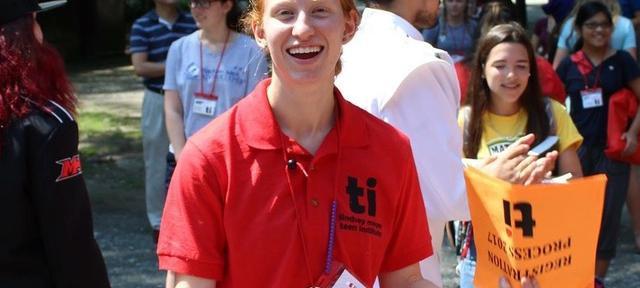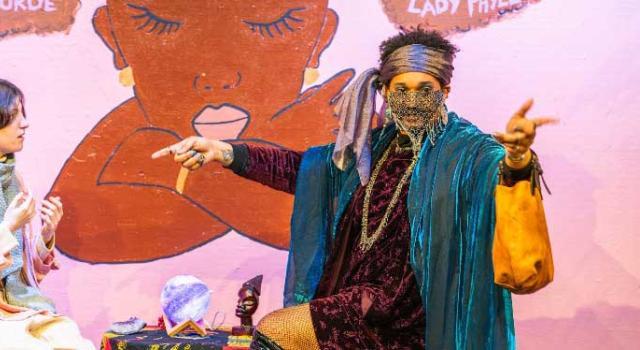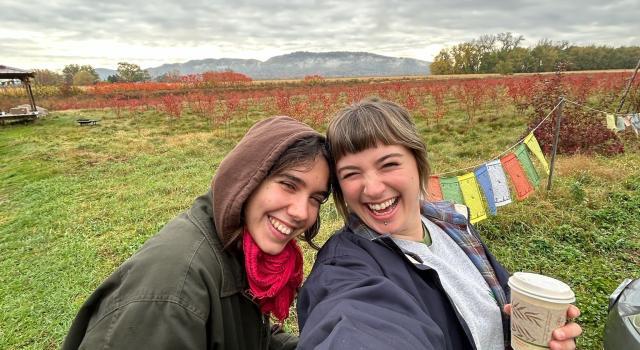Youth Leadership and Empowerment Through Collaborative Research

How do racism and the stigma of weight affect the self-worth of youth in Franklin County? That was the question a group of adolescents in Greenfield, Massachusetts, decided to explore using quantitative and qualitative research methods. They were led by Hampshire student Mac Dvorak, who was interning with the Community Action Youth Programs.
“During my Division II, I realized I really wanted to work with youth,” Dvorak says. So during their second year at Hampshire, they interned with organizations working with adolescents in the Pioneer Valley. “When I was looking through the course catalog for the spring, I saw a class about participatory action research and I thought: ‘Oh, I’ve never heard of that. That sounds interesting.’”
Participatory action research, also called community-based research, is an approach that empowers members of a community to act as their own researchers, instead of being the focus of study by outsiders. The community is prompted to choose a topic it’s interested in, develop a research question, amass information, and analyze the data. In the end, members can also look at how to solve the problem and implement possible solutions.
According to Dvorak, the approach sees members as “the ones who have the most expertise about their own community and who could benefit the most from that type of research. They should be the ones doing the research and having control over what happens with the results.”
At their time as an intern with the Community Action Youth Programs, Dvorak suggested that teens apply this type of research to an issue they considered important. And they agreed.
Dvorak then worked with a group of 12 teenagers on the question they decided to study, which turned out to be related to racism and weight. “We did some trainings about what focus groups are, what surveys are, and trying to figuring out what methodology would work well,” Dvorak explains.
The group recently conducted their last focus group and are now going to start analyzing the data. “I’ve been doing it in partnership with them but it’s really been the youth that have taken the lead,” Dvorak says. “I expected them to be interested in it, but was still surprised by how much they really cared about the topic and how motivated they were to do the work.”
Titled “Youth Organizing Leadership and Empowerment: Challenging Adultism Through Youth Participatory Action and Youth–Adult Partnerships,” their thesis is also an investigation into questions of leadership between adults and youth. “A lot of the written portion of my Div III has been trying to explore how adults can more equitably work with youth through projects like this,” Dvorak says.
Even though in some organizations Dvorak themselves would still be considered a youth, they feel in this project they were an adult guiding the process. “I’ve been trying to reflect on my own experiences facilitating and working with the youth and looking at different models and what's been researched already to try and come up with suggestions of how adults can better work with youth,” they say.
Melissa Burch, associate professor of cognitive development and chair of Dvorak’s Division III committee, says, “The level of development of their theoretical understanding and how they’re presenting their argument is pretty advanced and impressive.”
After graduating, Dvorak will be working with the organizations Outward Bound and The Lindsey Meyer Teen Institute. They were awarded the Clif Bar’s Business with Purpose Scholarship, which will fund a year of a project they designed related to teaching positive body image and self-esteem to youth girls through outdoor education.
The Hampshire experience
Dvorak came to Hampshire wanting to study film. But as they took classes in a variety of fields, things began to change. “I was doing lots of different interdisciplinary things with psychology and sociology and anthropology, really all over the map,” they say. “And being able to explore it all was what enabled me to arrive at what I was actually interested in.”
From film, Dvorak turned to youth leadership and empowerment. “I think my own experiences as a youth kind of shaped that in terms of struggling with a lot of different things and feeling the adults who were there to support me made such a big difference in my life,” they say. “I’d like to be a person like that for youth, someone who can be there to support them and who they can rely on.”



